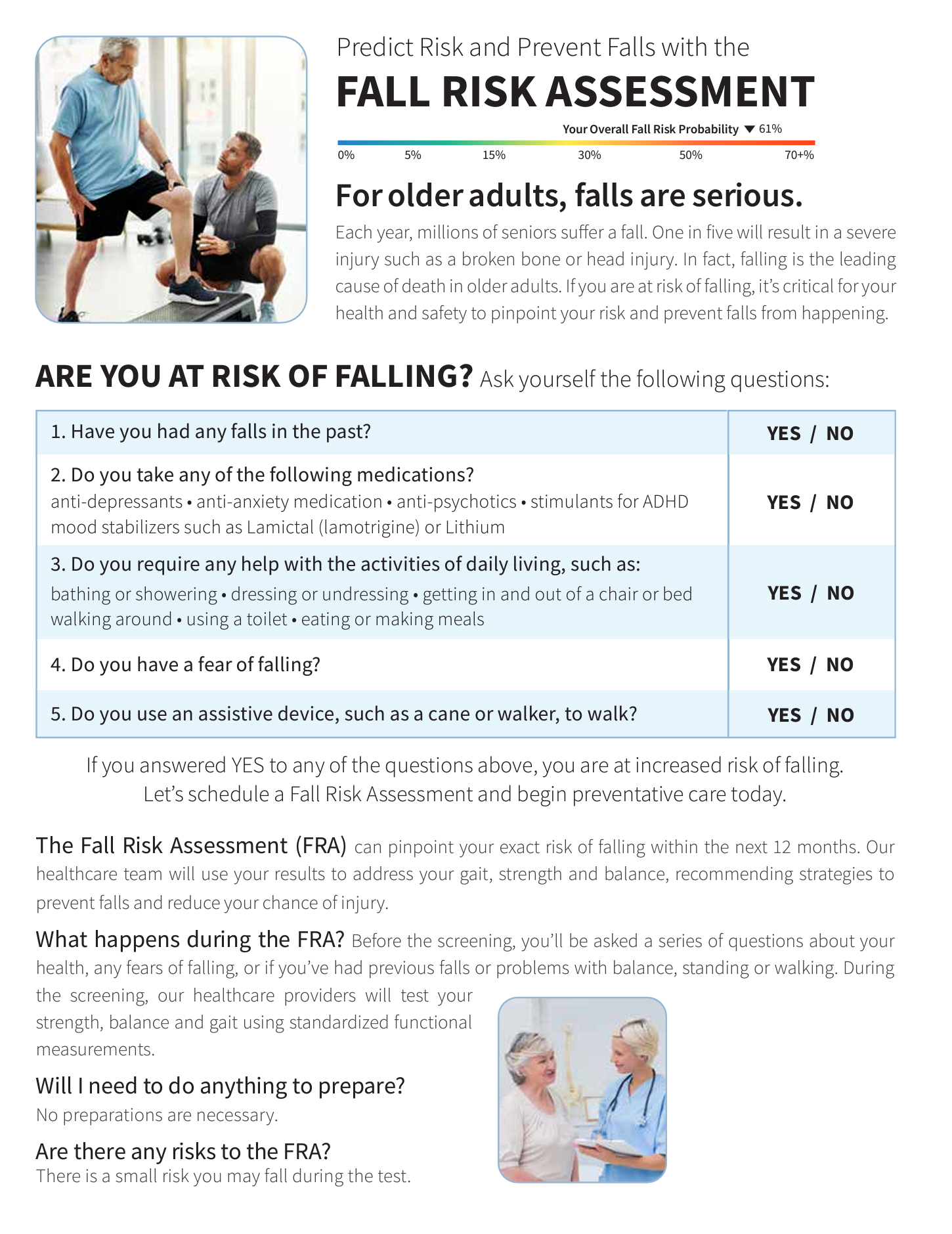Dementia Fall Risk Can Be Fun For Everyone
Dementia Fall Risk Can Be Fun For Everyone
Blog Article
The Basic Principles Of Dementia Fall Risk
Table of ContentsHow Dementia Fall Risk can Save You Time, Stress, and Money.The Ultimate Guide To Dementia Fall RiskSee This Report on Dementia Fall RiskGetting The Dementia Fall Risk To WorkNot known Facts About Dementia Fall Risk
You could be nervous because you've had a fall prior to or because you have actually discovered you're starting to feel unstable on your feet. You could have observed changes to your health, or simply seem like you're decreasing a little. Whatever the reason, it isn't uncommon to end up being cautious and lose confidence, and this can stop you doing the important things you made use of to do and make you really feel more isolated.If you have actually had an autumn or you've begun to feel unstable, tell your medical professional also if you really feel fine otherwise. Your physician can inspect your equilibrium and the way you walk to see if enhancements can be made. They might be able to refer you for a falls danger analysis or to the drops prevention solution.
This details can be acquired via meetings with the individual, their caretakers, and a review of their medical records. Begin by asking the specific regarding their history of drops, including the regularity and scenarios of any type of current falls. Dementia Fall Risk. Inquire about any mobility problems they may experience, such as unstable or trouble strolling
Conduct a thorough review of the person's drugs, paying certain focus to those recognized to increase the threat of drops, such as sedatives or drugs that reduced blood stress. Identify if they are taking several drugs or if there have been current modifications in their drug routine. Examine the person's home environment for potential hazards that could increase the threat of drops, such as poor lighting, loosened carpets, or lack of grab bars in the shower room.
The Best Guide To Dementia Fall Risk
Guide the person through the loss danger evaluation type, describing each question and videotaping their responses properly. Compute the overall threat rating based on the reactions offered in the analysis kind.
On a regular basis check the individual's progression and reassess their danger of drops as required. Offer recurring education and assistance to promote safety and security and minimize the risk of drops in their daily living activities.
Many research studies have actually revealed that physical therapy can assist to reduce the danger of dropping in grownups ages 65 and older. In a new study (that considered drops risk in females ages 80 and older), go now researchers calculated the financial effect of picking physical treatment to avoid drops, and they found that doing so conserves $2,144, including all the concealed prices of your time, pain, missed out on life occasions, and the bucks paid for services.
An Unbiased View of Dementia Fall Risk
Examining your heart price and high blood pressure measurements at remainder and while you turn (from sitting or existing to standing). A simple examination of your reasoning (cognitive) capabilities. Examining your equilibrium, toughness, and strolling capability. A simple vision test. Assessing your feet and shoes. A home security evaluation. Based upon the assessment results, your physical therapist will certainly create a plan that is customized to your details requirements.
Older adults that have difficulty strolling and speaking at the same time go to a greater risk of dropping. Dementia Fall Risk. To help raise your security during day-to-day activities, your physical therapist may create a training program that will certainly challenge you great post to read to keep standing and walking while you do another task. Instances include strolling or standing while counting in reverse, having a conversation, or lugging a bag of groceries
Establish goals for boosting their physical task. Exercise a lot more to enhance their toughness and balance. These programs commonly are led by volunteer coaches.
The Greatest Guide To Dementia Fall Risk

Measles, or rubeola, is a very infectious, severe viral transmittable disease caused by the measles virus. Some people think about measles as just a breakout and high temperature that clears in a few days; however, measles can trigger severe wellness complications, especially in kids younger than 5-years-old. The best protection versus measles is the measles, mumps, and rubella (MMR) injection.
Loss are an usual source of injury among older adults. According to the CDC, in one year alone, fall-related injuries added to over $50 billion in clinical expenses (Dementia Fall Risk). In medical facility settings, older adults are at especially high risk of falls since their minimized flexibility from being constrained to a space or bed.
The Definitive Guide to Dementia Fall Risk
-copy-5.jpg)
She has no background of drops, her gait is steady, and she nullifies with no issues. The previous registered nurse states that she calls for support to the washroom when she needs to go.
Instances of usual loss interventions/measures consist of: Making certain a person's important things are within reach. Placing the patient's bed rails up with the alarm on. Helping a client while they're rising from bed. Beyond recognizing how to make use of the Johns Hopkins Autumn Risk Evaluation Device, it is very important that centers incorporate its usage into a much more comprehensive autumn avoidance strategy.
Report this page